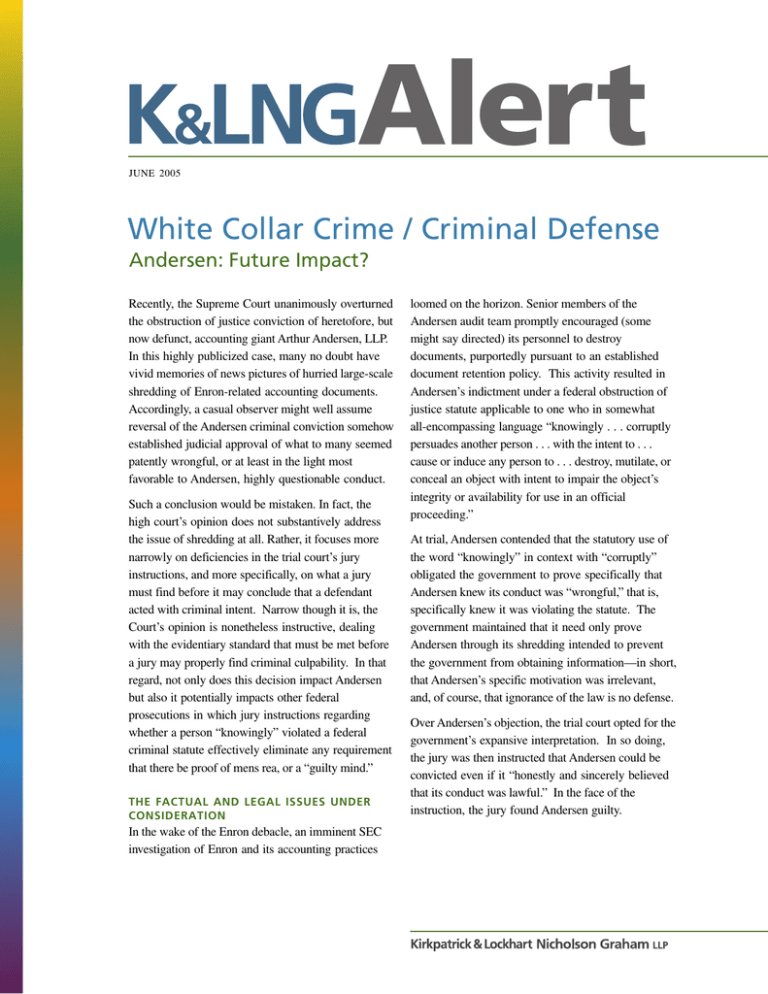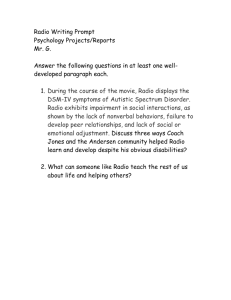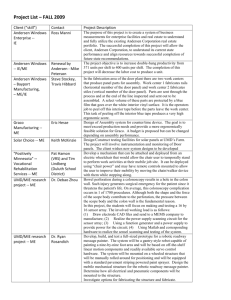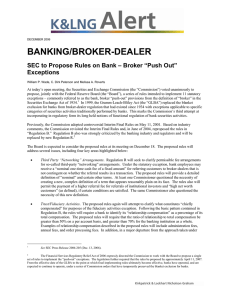
JUNE 2005
White Collar Crime / Criminal Defense
Andersen: Future Impact?
Recently, the Supreme Court unanimously overturned
the obstruction of justice conviction of heretofore, but
now defunct, accounting giant Arthur Andersen, LLP.
In this highly publicized case, many no doubt have
vivid memories of news pictures of hurried large-scale
shredding of Enron-related accounting documents.
Accordingly, a casual observer might well assume
reversal of the Andersen criminal conviction somehow
established judicial approval of what to many seemed
patently wrongful, or at least in the light most
favorable to Andersen, highly questionable conduct.
Such a conclusion would be mistaken. In fact, the
high court’s opinion does not substantively address
the issue of shredding at all. Rather, it focuses more
narrowly on deficiencies in the trial court’s jury
instructions, and more specifically, on what a jury
must find before it may conclude that a defendant
acted with criminal intent. Narrow though it is, the
Court’s opinion is nonetheless instructive, dealing
with the evidentiary standard that must be met before
a jury may properly find criminal culpability. In that
regard, not only does this decision impact Andersen
but also it potentially impacts other federal
prosecutions in which jury instructions regarding
whether a person “knowingly” violated a federal
criminal statute effectively eliminate any requirement
that there be proof of mens rea, or a “guilty mind.”
THE FACTUAL AND LEGAL ISSUES UNDER
CONSIDERATION
In the wake of the Enron debacle, an imminent SEC
investigation of Enron and its accounting practices
loomed on the horizon. Senior members of the
Andersen audit team promptly encouraged (some
might say directed) its personnel to destroy
documents, purportedly pursuant to an established
document retention policy. This activity resulted in
Andersen’s indictment under a federal obstruction of
justice statute applicable to one who in somewhat
all-encompassing language “knowingly . . . corruptly
persuades another person . . . with the intent to . . .
cause or induce any person to . . . destroy, mutilate, or
conceal an object with intent to impair the object’s
integrity or availability for use in an official
proceeding.”
At trial, Andersen contended that the statutory use of
the word “knowingly” in context with “corruptly”
obligated the government to prove specifically that
Andersen knew its conduct was “wrongful,” that is,
specifically knew it was violating the statute. The
government maintained that it need only prove
Andersen through its shredding intended to prevent
the government from obtaining information—in short,
that Andersen’s specific motivation was irrelevant,
and, of course, that ignorance of the law is no defense.
Over Andersen’s objection, the trial court opted for the
government’s expansive interpretation. In so doing,
the jury was then instructed that Andersen could be
convicted even if it “honestly and sincerely believed
that its conduct was lawful.” In the face of the
instruction, the jury found Andersen guilty.
THE POTENTIAL IMPACT OF THE SUPREME
COURT RULING
In reversing Andersen’s conviction, the Supreme Court
determined the trial court’s jury instructions were
fatally flawed, and more specifically that this
instruction failed to convey the requisite
consciousness of wrongdoing that a jury must find
before a criminal conviction can be sustained. The
Court opined that the use of “knowingly” taken in
juxtaposition with the “corruptly” wordage in the
statute mandated reversal because the government
interpretation and the instruction by the trial court did
not establish the requisite mens rea (or guilty mindset)
that must be the motivating factor in a criminal statute
that punishes knowing violations of the law. Not only
is this a ringing reaffirmation of mens rea as it relates
to the shredding of documents, but it also arguably
reinforces the need to assure that any instruction to a
jury regarding the knowledge required for a felony
conviction under federal statute must preserve that
essential mens rea requirement.
Perhaps of somewhat lesser prominence in the
opinion, the Court additionally held that the trial
court’s jury instructions were infirm because “[t]hey
led the jury to believe that it did not have to find any
nexus between the ‘persua[sion]’ to destroy
documents and any particular proceeding.” The
Court, again dealing with the “knowing” language,
held that one could not be a “knowingly … corrup[t]
persuade[r]” for encouraging others to shred
documents without having it be established “in
contemplation of a particular official proceeding in
which those documents might be material.”
As can be seen, the reach of this decision, its high
visibility notwithstanding, in no way exonerated
Andersen’s conduct, but merely reflects that the jury
was improperly instructed as to the law; thus, the
conviction could not stand. Indeed, Andersen could
be retried, although at this point, for a variety of
reasons it is problematic that this will occur. Yet the
Court’s discussion of “knowingly” not only in context
with “corruptly” but in its own right as well could
impact future interpretation of other criminal statutes
that use such similar “knowingly” verbiage, and thus
2 JUNE 2005
clarify standards for acting “knowingly” in a statutory
context. In short, it may be far less likely that one
could or would be charged criminally in future cases
absent a well-established/provable guilty mindset.
Accordingly, it may be instructive to consider, for
example, how future criminal prosecutions for
environmental crimes could be impacted where the
“knowingly” language is prevalent. All of the major
environmental statutes addressing the handling of a
variety of hazardous substances and wastes contain
felony provisions premised on a statutory provision
expressly requiring that a defendant “knowingly
violated” some aspect of the law. Over the years, the
government has sought, and often obtained, jury
instructions which, unlike Andersen, have been
affirmed on appeal at the Circuit Court level that:
(a) do not require knowledge of the law; (b) do not
require any actual knowledge of what the substance is
or that it is actually regulated; (c) do not require actual
knowledge that the illegal conduct occurred if the
defendant is a “responsible corporate officer;” and
(d) do not require any proof of bad motive or intent.
In short, such jury instructions have effectively
eliminated any requirement that the defendant have a
“guilty mindset.” The impact, if any, of the Andersen
decision respecting such jury instructions remains to
be seen.
Finally, it should be noted though that the Andersen
decision may be of limited future significance in the
context of obstruction of justice given a recent
statutory enactment (part of the Sarbanes-Oxley
legislation) passed subsequently to the Andersen
conduct at issue. This new legislation in arguably
clearer language makes such shredding and other
obstructing conduct illegal if done “with the intent to
impede, obstruct, or influence” any official
proceeding or “in relation to or in contemplation of”
any such proceeding. The government has stated its
intention to proceed under this statute in future cases
rather than the one under which Andersen was
charged. How that will affect the government’s
position on jury instructions in cases involving the
new statute remains to be seen.
KIRKPATRICK & LOCKHART NICHOLSON GRAHAM LLP
CONCLUSION
No one should take from this decision, whether in
reliance on the old or new obstruction statute, that
shredding of documents in the face of a government
investigation has in any way received a favorable
judicial imprimatur. Rather, as Chief Justice
Rehnquist speaking for the Court in Andersen’s case
cogently stated, a jury instruction that fails to set forth
“the requisite consciousness of wrongdoing” is fatally
flawed. Accordingly, one can take comfort that future
prosecution will not be predicated on conduct where a
defendant may be convicted even though honestly
believing that the questioned conduct is lawful. That
is, criminality should only attach where a guilty
mindset is clearly established.
Stephen W. Grafman
sgrafman@klng.com
202.778.9057
Barry M. Hartman
bhartman@klng.com
202.778.9338
David S. Kwon
dkwon@klng.com
973.848.4025
If you have questions or would like more information about K&LNG’s White Collar Crime/Criminal Defense practice,
please contact one of our White Collar Crime/Criminal Defense lawyers listed below:
Boston
Dallas
Los Angeles
Miami
Newark
New York
Pittsburgh
Washington, D.C.
Michael DeMarco
Jacqueline R. Peterson
Richard P. Crane, Jr.
Beatrice A. Butchko
David S. Kwon
John A. Azzarello
Eva M. Ciko
William O. Purcell
Mark A. Rush
Dick Thornburgh
Stephen W. Grafman
Barry M. Hartman
mdemarco@klng.com
jacqueline.peterson@klng.com
rcrane@klng.com
bbutchko@klng.com
dkwon@klng.com
jazzarello@klng.com
eciko@klng.com
wpurcell@klng.com
mrush@klng.com
dthornburgh@klng.com
sgrafman@klng.com
bhartman@klng.com
617.951.9111
214.939.4926
310.552.5089
305.539.3371
973.848.4025
973.848.4126
212.536.3905
212.536.3922
412.355.8333
202.778.9080
202.778.9057
202.778.9338
www
w.. k l n g . c o m
BOSTON DALLAS HARRISBURG LONDON LOS ANGELES MIAMI NEWARK NEW YORK PALO ALTO PITTSBURGH SAN FRANCISCO WASHINGTON
■
■
■
■
■
■
■
■
■
■
■
Kirkpatrick & Lockhart Nicholson Graham LLP (K&LNG) has approximately 950 lawyers and represents entrepreneurs, growth and middle market
companies, capital markets participants, and leading FORTUNE 100 and FTSE 100 global corporations nationally and internationally.
K&LNG is a combination of two limited liability partnerships, each named Kirkpatrick & Lockhart Nicholson Graham LLP, one qualified in Delaware, U.S.A.
and practicing from offices in Boston, Dallas, Harrisburg, Los Angeles, Miami, Newark, New York, Palo Alto, Pittsburgh, San Francisco and Washington and
one incorporated in England practicing from the London office.
This publication/newsletter is for informational purposes and does not contain or convey legal advice. The information herein should not be used or relied
upon in regard to any particular facts or circumstances without first consulting a lawyer.
Data Protection Act 1988 - We may contact you from time to time with information on Kirkpatrick & Lockhart Nicholson Graham LLP seminars and with our
regular newsletters, which may be of interest to you. We will not provide your details to any third parties. Please e-mail cgregory@klng.com if you would
prefer not to receive this information.
© 2005 KIRKPATRICK & LOCKHART NICHOLSON GRAHAM LLP. ALL RIGHTS RESERVED.






